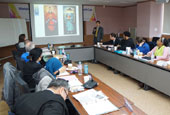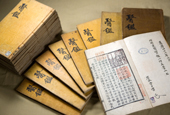Up until even the 1960s, people in the past often suffered from "spring austerity" as they ran out of food after consuming the prior year's autumn harvest and before the new crops were fully grown. Many people did not have a proper intake of various nutrients and they had serious nutritional imbalances since they mostly consumed just grain.
At the time, many Asians consumed rice as the staple item in their diet and often lacked vitamin B. With an insufficient intake of vitamin B, they suffered from various associated symptoms, including anemia, fatigue and skin diseases. Many people had itchy skin, showing white dead skin cells on the surface, due to a lack of vitamin B.
New Ilhan (1895-1971), founder of Yuhan Corporation, knew about the situation very well and personally asked his employees to develop a vitamin complex that the company could supply at a reasonable price. This is how the vitamin complex Beecom-C was born. When it was first launched in 1963, it was marketed as Beecom, an abbreviation for "vitamin B complex." The company ran a newspaper ad that went, "A vitamin B supplement is absolutely necessary," and the ad raised awareness of the importance of vitamin B intake across the country.

Beecom led the local vitamin market in the 1960s and 1970s. Its sales increased 1,239 percent by 1975, only 12 years after its launch. In 1987, 20 years after the launch, its vitamin C content jumped from 50 milligrams to 600 milligrams and it was re-branded as Beecom-C, with the letter C indicating vitamin C. The tablet was film-coated to make it easier for people to swallow.
The company continued to introduce an extended line of Beecom-C products to satisfy the diversified needs of its consumers. It launched Beecom-C F by adding folic acid, vitamin E, and iron, among others, in 1997. The company also introduced Beecom-C Ace by adding anti-oxidation nutrients and other necessary minerals in 2004.
In the latter half of 2012, Beecom-C experienced many changes. Vitamin E and anti-oxidation nutrients, including selenium, were added to the original Beecom-C formula. The company also introduced a vitamin complex targeted at women, Beecom-C Eve. In addition to existing nutrients, the product also contains more minerals, including iron and magnesium, vitamin E, and anti-oxidation nutrients, including the coenzyme Q10.
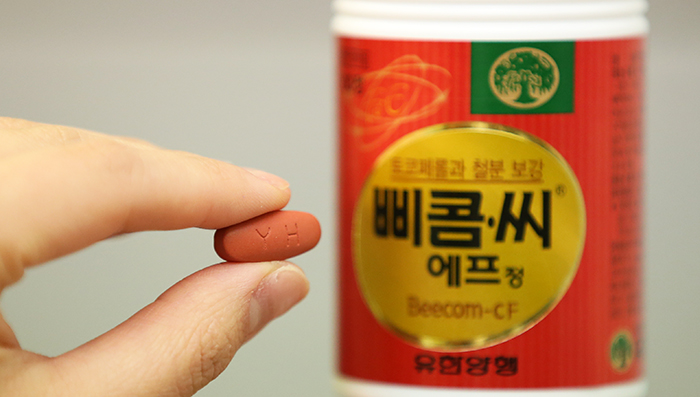
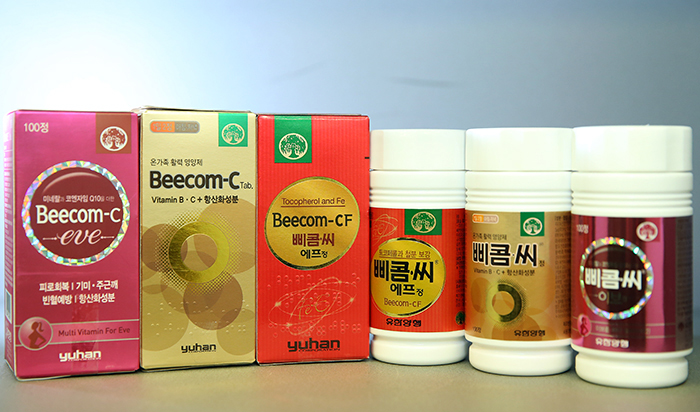
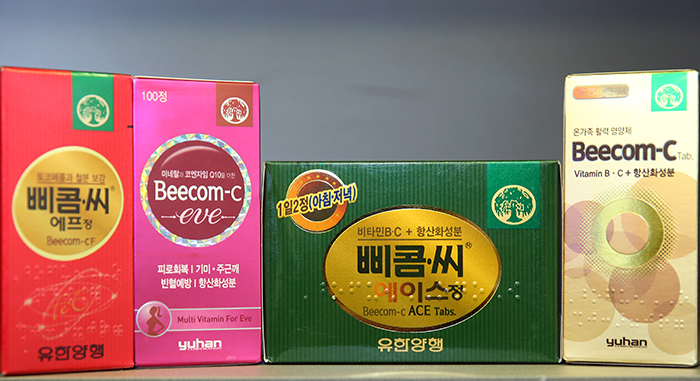
Beecom-C has pioneered an era of supplemental vitamin complexes and even after half a century, it is still loved by the public, known as being a vitamin supplement for the whole family.
"During the change of seasons, it is important to take the proper nutrients. So it is a good idea to take vitamin supplements along with sufficient fruits and vegetables," said a manager at Yuhan. "Beecom-C is made adhering to our corporate philosophy of creating good, healthy products."
By Limb Jae-un
Photos: Jeon Han
Korea.net Staff Writers
jun2@korea.kr
At the time, many Asians consumed rice as the staple item in their diet and often lacked vitamin B. With an insufficient intake of vitamin B, they suffered from various associated symptoms, including anemia, fatigue and skin diseases. Many people had itchy skin, showing white dead skin cells on the surface, due to a lack of vitamin B.
New Ilhan (1895-1971), founder of Yuhan Corporation, knew about the situation very well and personally asked his employees to develop a vitamin complex that the company could supply at a reasonable price. This is how the vitamin complex Beecom-C was born. When it was first launched in 1963, it was marketed as Beecom, an abbreviation for "vitamin B complex." The company ran a newspaper ad that went, "A vitamin B supplement is absolutely necessary," and the ad raised awareness of the importance of vitamin B intake across the country.

A newspaper ad released in 1963 suggests that people take Beecom when they suffer from a loss of appetite or feel fatigue.
Beecom led the local vitamin market in the 1960s and 1970s. Its sales increased 1,239 percent by 1975, only 12 years after its launch. In 1987, 20 years after the launch, its vitamin C content jumped from 50 milligrams to 600 milligrams and it was re-branded as Beecom-C, with the letter C indicating vitamin C. The tablet was film-coated to make it easier for people to swallow.
The company continued to introduce an extended line of Beecom-C products to satisfy the diversified needs of its consumers. It launched Beecom-C F by adding folic acid, vitamin E, and iron, among others, in 1997. The company also introduced Beecom-C Ace by adding anti-oxidation nutrients and other necessary minerals in 2004.
In the latter half of 2012, Beecom-C experienced many changes. Vitamin E and anti-oxidation nutrients, including selenium, were added to the original Beecom-C formula. The company also introduced a vitamin complex targeted at women, Beecom-C Eve. In addition to existing nutrients, the product also contains more minerals, including iron and magnesium, vitamin E, and anti-oxidation nutrients, including the coenzyme Q10.

Beecom-C F contains folic acid, vitamin E, and iron in addition to the original Beecom-C formula.


(From left) Beecom-C F, Beecom-C Eve, Beecom-C Ace, and Beecom-C are vitamin B and C complexes made by Yuhan.
Beecom-C has pioneered an era of supplemental vitamin complexes and even after half a century, it is still loved by the public, known as being a vitamin supplement for the whole family.
"During the change of seasons, it is important to take the proper nutrients. So it is a good idea to take vitamin supplements along with sufficient fruits and vegetables," said a manager at Yuhan. "Beecom-C is made adhering to our corporate philosophy of creating good, healthy products."
By Limb Jae-un
Photos: Jeon Han
Korea.net Staff Writers
jun2@korea.kr
